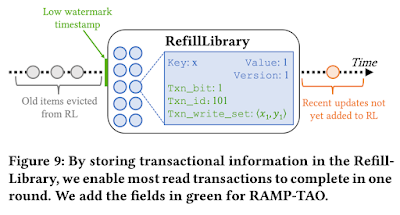Efficient Replication via Timestamp Stability (EuroSys 2021)

This paper introduces Tempo is a leaderless Paxos variant for implementing a state machine replication (SMR) protocol. Leaderless means, there is no dedicated/stable Paxos leader, instead any node can become a proposer any time (allowing many concurrent proposers) and get consensus on a proposal opportunistically. In this blog, we had discussed many examples of leaderless and multileader Paxos variants, including Mencius , MDCC , ePaxos , wPaxos , SDPaxos , Hermes , Atlas . And there are several more that we didn't get to yet. It seems like I've been proven right when I foretold my PhD students in 2016 that we will be seeing a Paxos renaissance. On the flip side, you may ask, why do we need another Paxos variant? My selfish answer is that I love Paxos variants. A more practical answer is that because this one simplifies/streamlines the leaderless SMR ideas a bit more. Recently we have been seeing a convergence of the leaderless SMR ideas with loosely synchronized clocks. This ...


